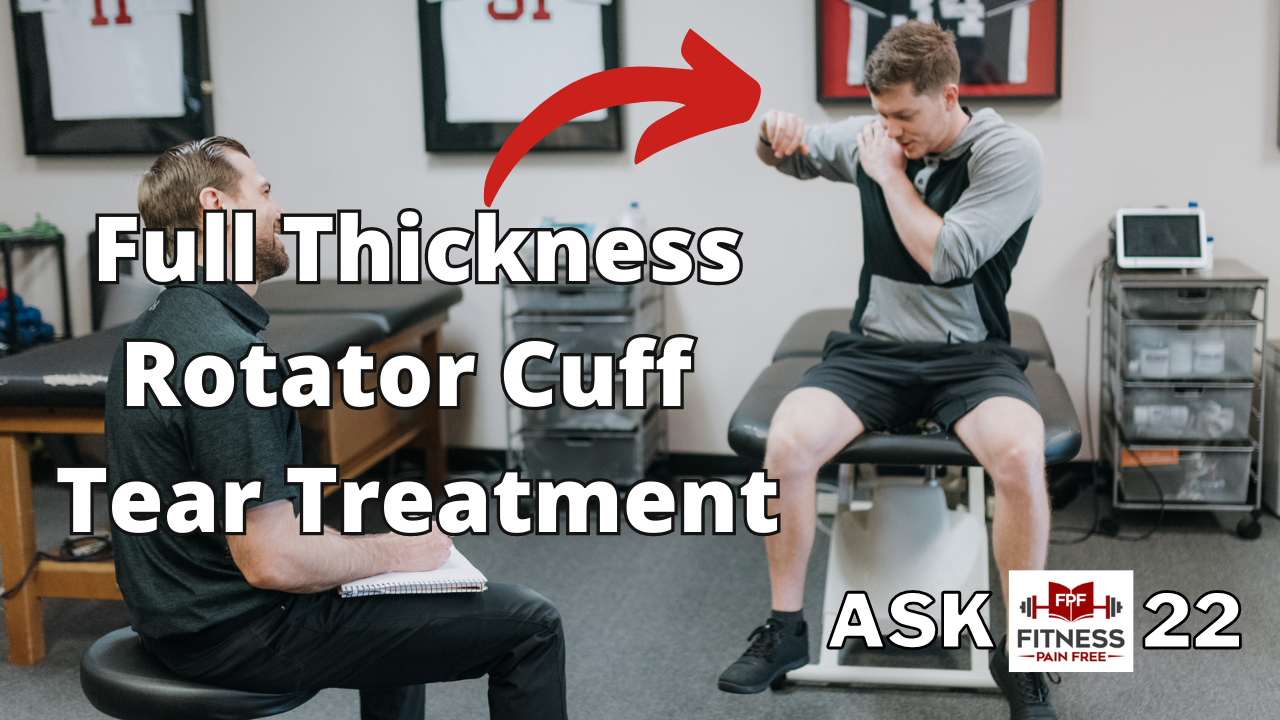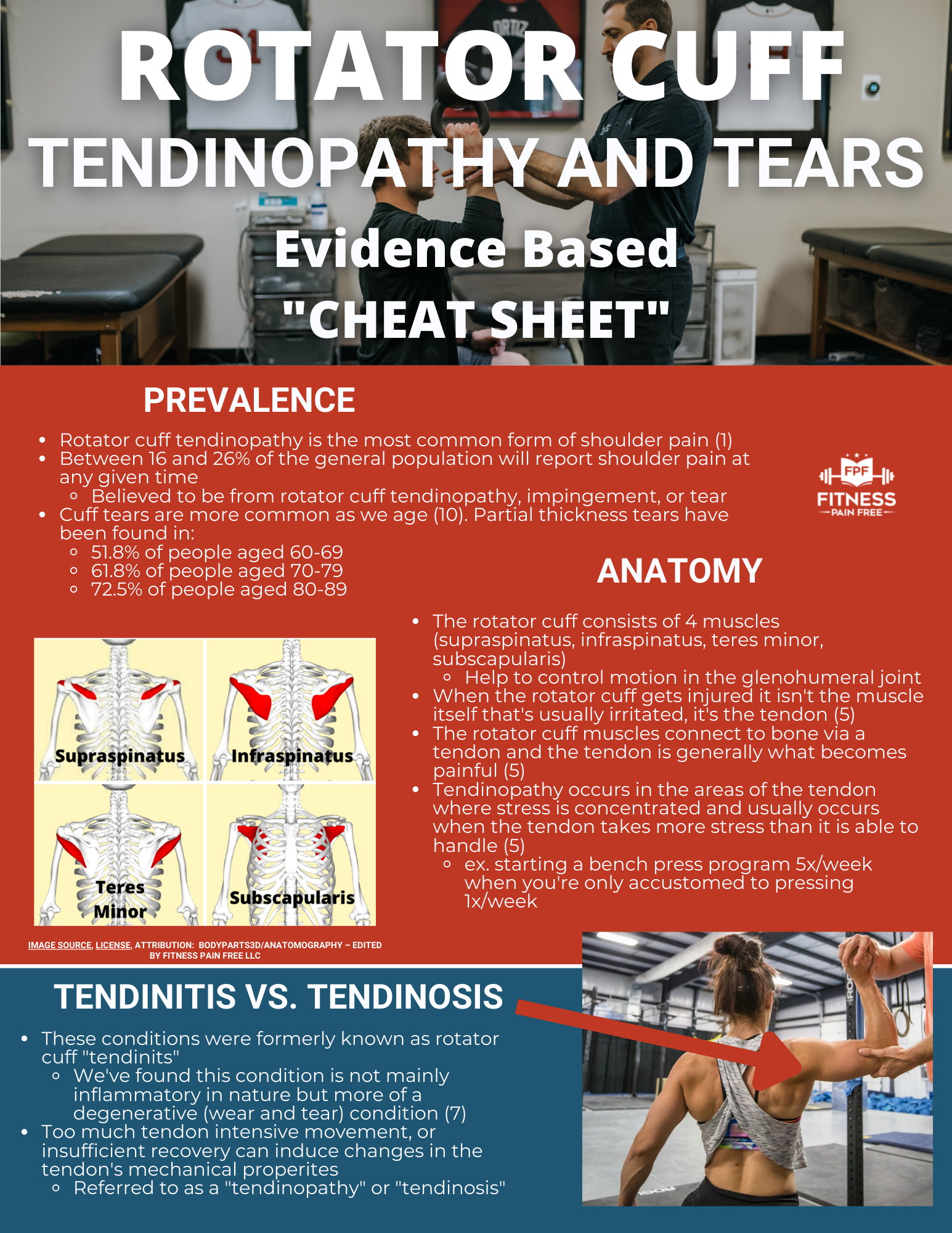
Evidence Based Treatment of Full Thickness Rotator Cuff Tears | Non-Operative Management: AskFPF E:23
To go along with today's episode I have a nice infographic to share...
Sign up to receive FREE: Rotator Cuff Tendinopathy and Tears - The Evidence Based Cheat Sheet
Click HERE to Download FREE
Grab the rest of the Mini Course and Sign up for the Certification Pre-sale list:
- FPF Mini Course - 7 Reasons Why Injuries Happen in the Gym and What to do About it
- The Fitness Pain Free Certification
In today's episode we go over Evidence Based Treatment of Full Thickness Rotator Cuff Tears | Non-Operative Management:
As a physical therapist, you may encounter patients with full thickness rotator cuff tears who are unsure whether to pursue surgical or conservative treatment options. While surgical intervention may seem like the obvious choice, it's essential to know when to refer patients for surgery and when to trial conservative treatment options. Here, we'll discuss the importance of making this distinction and what factors to consider.
Firstly, it's important to recognize that not all full thickness rotator cuff tears require surgical intervention. Many patients can find relief through conservative treatments such as physical therapy. As a physical therapist, it's your job to help the patient determine whether surgery is necessary.
Factors that may influence your decision include the size and location of the tear, the patient's age and overall health, and their functional goals. If the tear is small, symptoms relatively minor and the patient is older or has other underlying health issues, surgery may not be the best option. Conversely, if the tear is large, and the patient is young and active, surgical intervention may be necessary to restore full function.
It's also important to consider the potential risks and benefits of surgery. While surgery can provide significant relief and improved function, it's not without risks, including infection, nerve damage, and postoperative complications. Patients may also face a longer recovery time and require extensive rehabilitation.
As a physical therapist, your role is to educate your patients on the risks and benefits of both surgical and conservative treatment options and help them make an informed decision based on their individual circumstances. Referring patients for surgical consultation when appropriate can ensure that they receive the most effective treatment for their condition.
Once you've determined that conservative management is the way to go, you'll have to know how to treat the injury. In today's video we go over some literature to help guide your physical therapy treat as well as decision making for when to refer to the surgeon:
In conclusion, knowing when to refer for rotator cuff surgery versus when to trial conservative treatment for full thickness rotator cuff tears is crucial to providing optimal care for your patients. As a physical therapist, it's your responsibility to assess the severity of the tear, the patient's individual circumstances, and the potential risks and benefits of both surgical and conservative treatments to help them make an informed decision.
All cuffed up,
- Dan Pope DPT,OCS,CSCS
Show Notes / Relevant Articles:
- FPF Mini Course - 7 Reasons Why Injuries Happen in the Gym and What to do About it
- Recovery from Rotator Cuff Repair | Physical Therapy Rehabilitation | CrossFit Case Study P1
- Guide to Physical Therapy After Arthroscopic Rotator Cuff Repair [Evidence Based 2023] Part 1 - FPF Show Episode 68
- When Do Rotator Cuff Tears Fail After Surgical Repair? | Arthroscopic Surgery, Physical Therapy
- The Ultimate Guide to Rotator Cuff Tears, Tendinopathy and Sub-acromial Impingement Syndrome
- Physical Therapy Diagnosis and Treatment for Rotator Cuff Tendinitis / Impingement
- What Physical Therapists NEED to Know About Rotator Cuff Repair from an Orthopedic Surgeon
- Do I Need Surgery for My Torn Rotator Cuff?
Want to support me and decide topics for future episodes? Click HERE to sign up for FPF "Insiders" for just a dollar. You'll gain access to 100+ webinars, e-books and complete guides. Plus, you'll get private access to the "Insiders" Facebook group where you can have all of your questions answered by me.
Looking for other ways to support me that are 100% free?
- Like, comment and share on youtube, facebook and instagram
- Leave a 5-star review on apple podcasts
Thank you!
Dan Pope DPT, OCS, CSCS
References:
Kuhn JE, Dunn WR, Sanders R, An Q, Baumgarten KM, Bishop JY, Brophy RH, Carey JL, Holloway BG, Jones GL, Ma CB, Marx RG, McCarty EC, Poddar SK, Smith MV, Spencer EE, Vidal AF, Wolf BR, Wright RW; MOON Shoulder Group. Effectiveness of physical therapy in treating atraumatic full-thickness rotator cuff tears: a multicenter prospective cohort study. J Shoulder Elbow Surg. 2013 Oct;22(10):1371-9. doi: 10.1016/j.jse.2013.01.026. Epub 2013 Mar 27. PMID: 23540577; PMCID: PMC3748251.
Jeanfavre M, Husted S, Leff G. EXERCISE THERAPY IN THE NON-OPERATIVE TREATMENT OF FULL-THICKNESS ROTATOR CUFF TEARS: A SYSTEMATIC REVIEW. Int J Sports Phys Ther. 2018 Jun;13(3):335-378. PMID: 30038823; PMCID: PMC6044593.
Shepet KH, Liechti DJ, Kuhn JE. Nonoperative treatment of chronic, massive irreparable rotator cuff tears: a systematic review with synthesis of a standardized rehabilitation protocol. J Shoulder Elbow Surg. 2021 Jun;30(6):1431-1444. doi: 10.1016/j.jse.2020.11.002. Epub 2020 Dec 1. PMID: 33276163.
Kukkonen J, Joukainen A, Lehtinen J, Mattila KT, Tuominen EK, Kauko T, Aärimaa V. Treatment of non-traumatic rotator cuff tears: A randomised controlled trial with one-year clinical results. Bone Joint J. 2014 Jan;96-B(1):75-81. doi: 10.1302/0301-620X.96B1.32168. PMID: 24395315.
Moosmayer S, Lund G, Seljom US, Haldorsen B, Svege IC, Hennig T, Pripp AH, Smith HJ. At a 10-Year Follow-up, Tendon Repair Is Superior to Physiotherapy in the Treatment of Small and Medium-Sized Rotator Cuff Tears. J Bone Joint Surg Am. 2019 Jun 19;101(12):1050-1060. doi: 10.2106/JBJS.18.01373. PMID: 31220021.
Longo UG, Risi Ambrogioni L, Candela V, Berton A, Carnevale A, Schena E, Denaro V. Conservative versus surgical management for patients with rotator cuff tears: a systematic review and META-analysis. BMC Musculoskelet Disord. 2021 Jan 8;22(1):50. doi: 10.1186/s12891-020-03872-4. Erratum in: BMC Musculoskelet Disord. 2021 Sep 2;22(1):752. PMID: 33419401; PMCID: PMC7796609.
Ryösä A, Laimi K, Äärimaa V, Lehtimäki K, Kukkonen J, Saltychev M. Surgery or conservative treatment for rotator cuff tear: a meta-analysis. Disabil Rehabil. 2017 Jul;39(14):1357-1363. doi: 10.1080/09638288.2016.1198431. Epub 2016 Jul 6. PMID: 27385156.
Longo UG, Risi Ambrogioni L, Candela V, Berton A, Carnevale A, Schena E, Denaro V. Conservative versus surgical management for patients with rotator cuff tears: a systematic review and META-analysis. BMC Musculoskelet Disord. 2021 Jan 8;22(1):50. doi: 10.1186/s12891-020-03872-4. Erratum in: BMC Musculoskelet Disord. 2021 Sep 2;22(1):752. PMID: 33419401; PMCID: PMC7796609.

